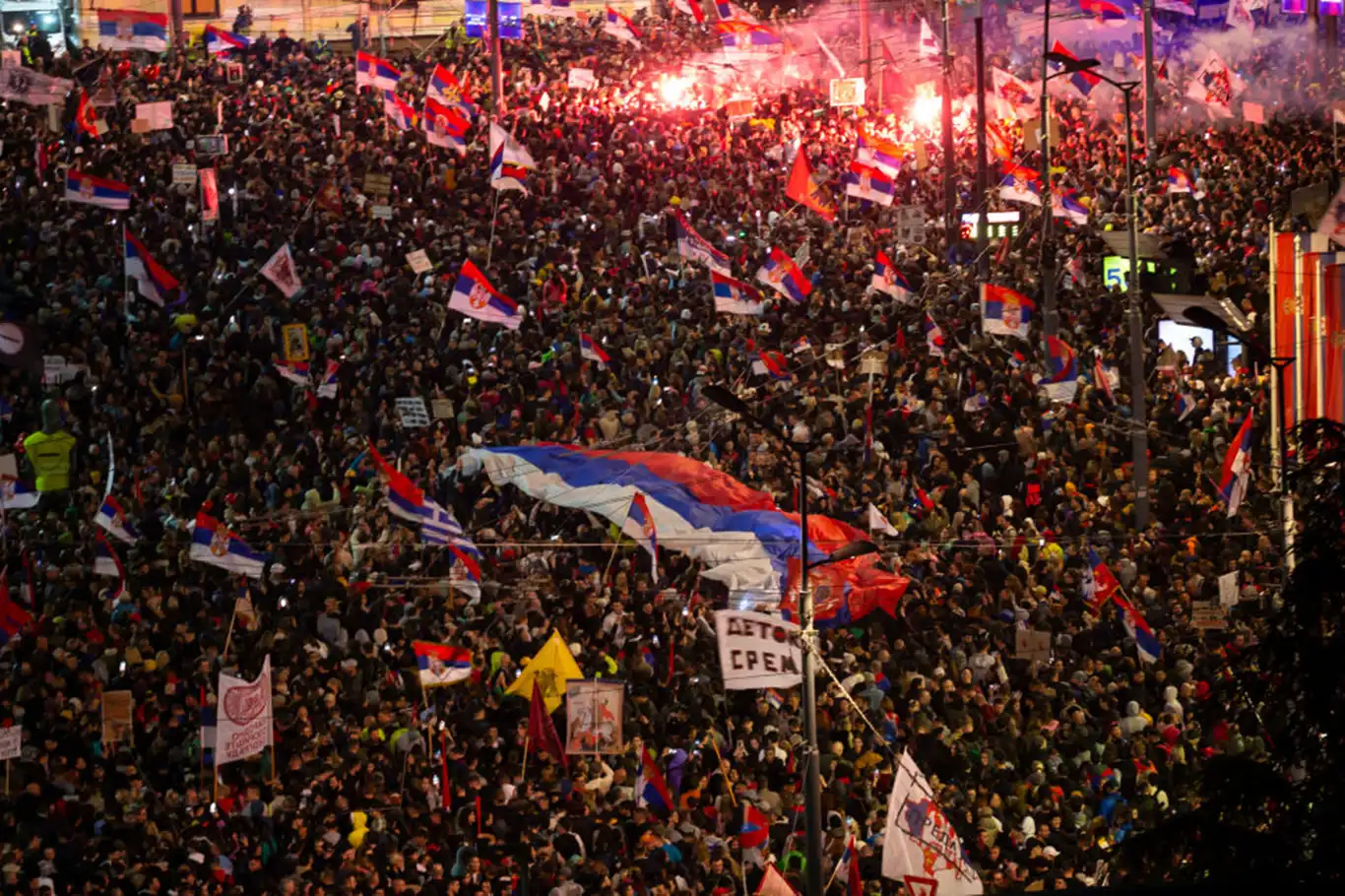Serbia engulfed in political turmoil as anti-government protests escalate


Serbia is facing its most severe political crisis in more than a decade, as nationwide anti-government protests have entered their fifth consecutive night, escalating into violent confrontations with security forces.
In the city of Valjevo, masked demonstrators set fire to the offices of the ruling Serbian Progressive Party (SNS) before clashing with riot police. Security forces deployed tear gas and stun grenades as protesters hurled fireworks, rocks, and bottles in Valjevo, Belgrade, and Novi Sad, signaling a sharp escalation in the unrest.
The protests were initially sparked by the collapse of a railway station canopy in Novi Sad in November 2024, which killed 16 people. Public outrage over the tragedy quickly evolved into a broader anti-corruption movement, with demonstrators blaming systemic negligence and graft in government infrastructure projects for the disaster. What began as peaceful vigils has grown into a mass uprising against President Aleksandar Vučić’s 12-year rule.
On Saturday, Slavija Square in Belgrade drew an estimated 140,000 protesters, according to the Independent Protest Monitor, Archive of Public Gatherings. Chants of “We want elections!” echoed across the capital as tens of thousands more filled surrounding streets.
Tensions further flared after viral videos circulated on social media showing police beating unarmed demonstrators. One widely shared clip from Valjevo depicted officers kicking and striking a young man with batons, sparking outrage and drawing international condemnation.
The Council of Europe’s Commissioner for Human Rights, Michael O’Flaherty, voiced alarm at the excessive use of force, urging Serbian authorities to respect the right to peaceful assembly and democratic norms.
Despite mounting pressure, President Vučić has remained defiant, rejecting calls for early elections and framing the protests as a foreign-backed conspiracy. “You cannot defeat Serbia with violence,” Vučić declared in a statement on Instagram, praising police for their “patriotic” actions.
Russia has publicly backed Vučić, reinforcing his claims of external interference, while critics argue his ties to Moscow and Beijing highlight authoritarian tendencies.
On August 16, protests in Novi Sad intensified as demonstrators vandalized SNS headquarters, smearing red paint and smashing windows before police dispersed the crowd with tear gas. In Belgrade, confrontations between demonstrators and government loyalists—some allegedly hired gangs dressed in uniform black clothing—raised fears of orchestrated provocations.
Reports that individuals like Djordje Prelić, a convicted murderer, were among pro-government enforcers have further fueled public outrage.
The protest wave has been largely student-led, with university groups mobilizing tens of thousands nationwide. “We will rally as long as it takes until the demands are met,” said law student Stefan Ivakovic, emphasizing calls for accountability and early elections.
Demonstrators accuse authorities of obstructing justice in the Novi Sad case, pointing to judicial inaction against those deemed responsible for the deadly collapse.
The European Union’s Commissioner for Enlargement, Marta Kos, described reports of violence as “deeply concerning,” warning that Serbia’s EU accession path hinges on respect for democratic rights, freedom of expression, and a free press. UN human rights experts echoed the concerns, citing a “troubling pattern of repression” that includes intimidation, arrests, and physical assaults on peaceful demonstrators.
As Serbia approaches the first anniversary of the Novi Sad tragedy, the protests have become a defining test of the nation’s democratic resilience. While Vučić vows further arrests, opposition leaders warn that continued defiance may radicalize the movement and plunge the country into deeper turmoil.
With anger mounting and demonstrations swelling, Serbia stands at a political crossroads—caught between entrenched authoritarianism and a growing public demand for change. (ILKHA)
LEGAL WARNING: All rights of the published news, photos and videos are reserved by İlke Haber Ajansı Basın Yayın San. Trade A.Ş. Under no circumstances can all or part of the news, photos and videos be used without a written contract or subscription.
The Palestinian resistance movement Hamas has issued a strong warning against the latest Israeli military intentions, describing the approval of plans to invade Gaza City as a declaration of “a new wave of brutal genocide and mass displacement” targeting hundreds of thousands of civilians.
A shooting at a Brooklyn restaurant left three people dead and eight others injured early Sunday morning, authorities confirmed.
The Palestinian Ministry of Health in Gaza reported on Sunday the martyrdom of 49 more Palestinians in the last 24 hours in the assaults by the Zionist Israeli regime. Meanwhile the attacks wounded 226 others.